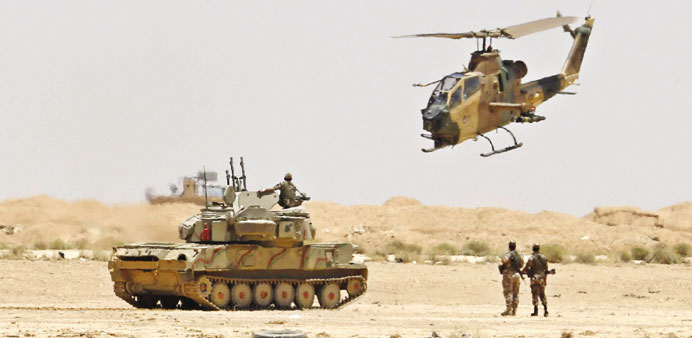A Jordanian military helicopter flies over an armoured vehicle near the Karameh border crossing on the Jordanian-Iraqi border near Ruweished city yesterday.
Jordanian military and political officials vowed yesterday to prevent advancing Sunni militants from crossing into the Western-backed kingdom, putting on a public show of force along its fortified desert border with Iraq.
Two helicopters hovered at low altitude above the Karameh border point, while scores of armoured vehicles and Humvees mounted with machineguns replaced the convoys of trucks which usually ply one of the Middle East’s main trade routes.
The rapid advances across western Iraq by fighters of the Islamic State of Iraq and the Levant (ISIL) have left Jordan scrambling to reinforce a second border from the effects of conflict now convulsing two of its neighbours.
To the north, Syria’s three-year civil war has brought a deluge of refugees and raised fears that Jordanians who join rebels ranks could turn their guns on domestic targets when they return home, radicalised by war.
The turmoil to the east poses an even more direct threat, with ISIL fighters bent on recreating a regional Islamic caliphate, eliminating 20th century colonial borders which they refuse to recognise.
“Borders are key to war and peace and our duty is to prevent extremist groups from infiltrating,” General Saber al-Mahayrah told journalists at the headquarters of Jordan’s military border guard forces before a tour of the border area. “We will not allow a single person to enter our territory illegally.”
At the Karameh border crossing at least 10 armoured vehicles were stationed, while scores of Humvees were seen on the road towards Karameh. Officers said many of the tanks had been deployed from their headquarters to outposts stretched across hundreds of kilometres of remote desert.
At the normally bustling crossing, about 30 trucks could be seen crossing from Iraq over a period of about an hour, while around a dozen went the other way. One truck driver said traffic had fallen by more than a third in recent days.
“Before ISIL came, there was round the clock traffic and Iraqis would buy water, water melons, everything,” said Omar Imri, a shopkeeper in Ruwaished, the last Jordanian town before the border.
While commercial traffic may have fallen, residents of the town of Safai, that lies on the Amman-Baghdad highway near the border, said the last time they saw a similar scale of military movement was during the 2003 US invasion of Iraq to topple Saddam Hussein.
Ismail Kaoud, a truck driver arriving from the Iraqi town of Ramadi, said Iraqi troops loyal to the Shia-led government of Prime Minister Nuri al-Maliki had pulled out of much of the western border province of Anbar, just as they retreated in front of ISIL’s push to Baghdad from north Iraq.
He said around 150 Iraqi police, customs officials and soldiers were still manning the Iraqi side of the border. However, Jordanian army personnel, speaking anonymously, said they suspected armed tribesmen were in charge.
In addition to the overt security measures, a Jordanian official said authorities were in contact with Sunni Muslim tribal leaders in Anbar to try to curb the influence of the Sunni Islamist ISIL fighters.
Two officers said on condition of anonymity that dozens of tanks, mortar guns and rocket launchers were moved in the last week from major army bases in the frontier area and deployed at the border outpost.
“Jordan is a state that is fully in control of its own territory,” Foreign Minister Nasser Judeh told Britain’s BBC yesterday.
“If (ISIL) try to get one inch close to the Jordanian border, they get the full might of the Jordanian armed forces retaliating so they know better,” he said.
Those armed forces look increasingly stretched as they try to seal 375km of mainly remote desert border with Syria in addition to the 180km of border with Iraq.
The real danger to the kingdom, however, is unlikely to be an immediate military threat.
“The fear is not that ISIL will invade Jordan - unlike Iraq, Jordan has a professional army and a serious presence along its border - but that ISIL will destabilise the kingdom through sustained attempts at infiltration and acts of terror,” the security consultancy Soufan Group said.
Kerry to visit Saudi Arabia for talks
US Secretary of State John Kerry will travel to Saudi Arabia tomorrow for talks with King Abdullah about the crisis in Iraq.
Speaking on the sidelines of talks at Nato, Kerry announced the extra stop on his current whirlwind tour saying he would stress “the great urgency” of the conflict in Iraq and brief Saudi leaders on his visits to Baghdad and Arbil this week.
“President Obama has also asked me travel to Saudi Arabia on Friday in order to meet with his majesty King Abdullah to discuss regional issues, including clearly the situation in Iraq,” Kerry told a press conference yesterday in Brussels.
The two men would also talk about “how we can counter the sheer threat that is posed by ISIL as well as to discuss our support for the moderate opposition in Syria”.

